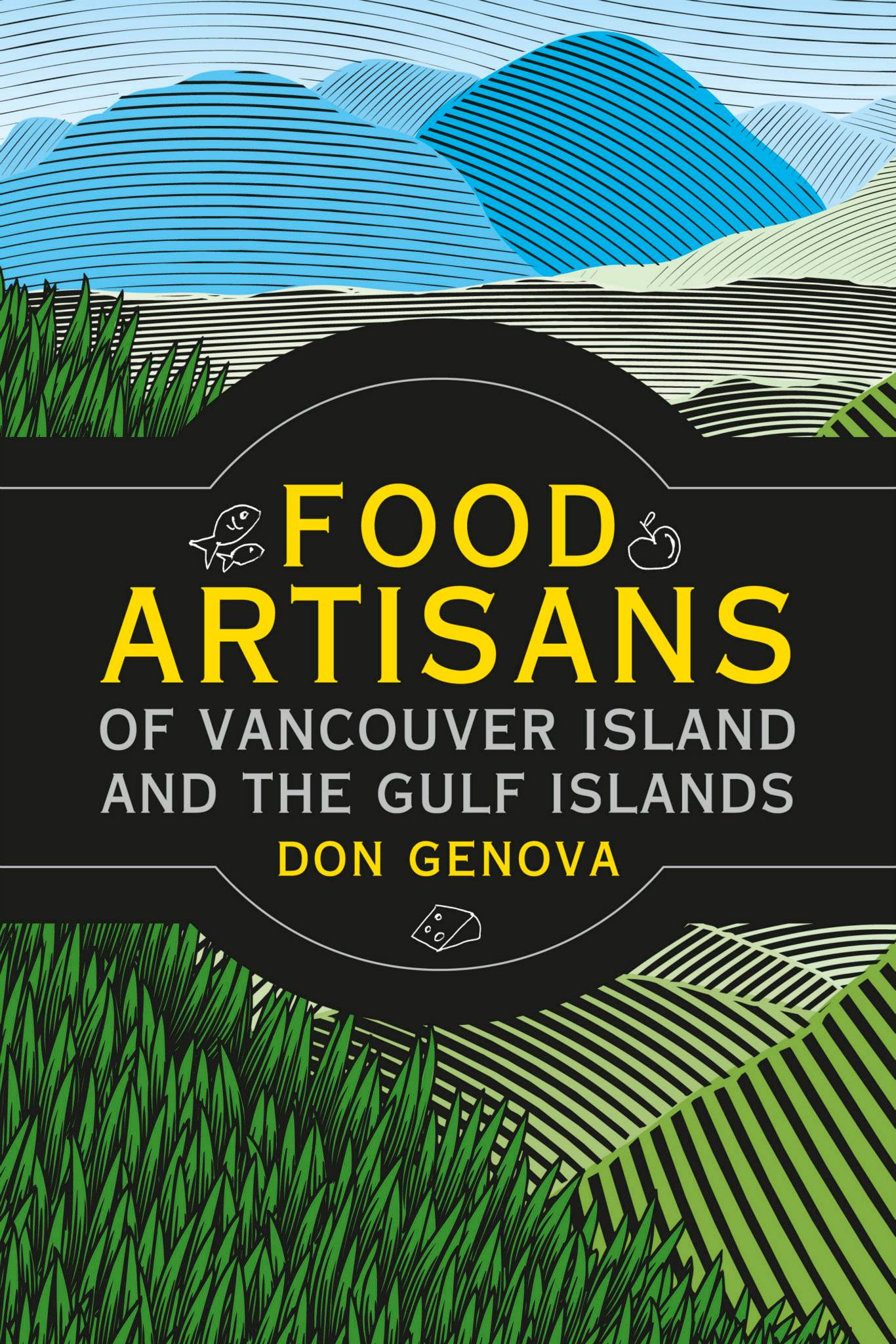 The sun is setting on Good Friday in the city of Trapani, western Sicily. It’s not too far from where my father’s parents came from, and they probably came to watch this procession a hundred years ago just like I am today.
The sun is setting on Good Friday in the city of Trapani, western Sicily. It’s not too far from where my father’s parents came from, and they probably came to watch this procession a hundred years ago just like I am today.
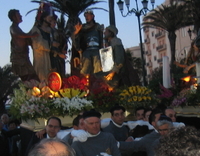 Every Good Friday for hundreds of years the people of Trapani have carried the Misteri through the streets of the city. They are huge wooden sculptures depicting the Passion and the death of Jesus. They are carried on the shoulders of men who stamp out their slow steps to the music of the bands.
Every Good Friday for hundreds of years the people of Trapani have carried the Misteri through the streets of the city. They are huge wooden sculptures depicting the Passion and the death of Jesus. They are carried on the shoulders of men who stamp out their slow steps to the music of the bands.
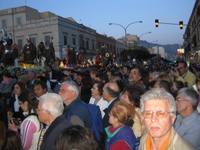 While the procession itself is somber, the atmosphere around it is like a carnival, as Christians get ready to celebrate Easter with much feasting.
While the procession itself is somber, the atmosphere around it is like a carnival, as Christians get ready to celebrate Easter with much feasting.
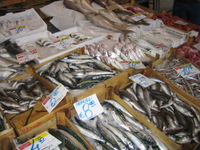 8 o’clock Saturday morning. I’m at the Trapani fish market, a covered warehouse close to the fish docks. Local buyers poke and prod at the catch to make sure they get the freshest possible. There are huge swordfish on display, and tiny needlefish called cigarillos. Red mullet, anchovies and sardines figure prominently in Sicilian cuisine. It’s not tuna season just yet, but at some stalls you can find tuna steaks carved from a carcass frozen at sea. Or something called bottarga, which the compressed, salted and dried eggs of the tuna. It can be sliced or grated on to cooked pasta for a salty kick.
8 o’clock Saturday morning. I’m at the Trapani fish market, a covered warehouse close to the fish docks. Local buyers poke and prod at the catch to make sure they get the freshest possible. There are huge swordfish on display, and tiny needlefish called cigarillos. Red mullet, anchovies and sardines figure prominently in Sicilian cuisine. It’s not tuna season just yet, but at some stalls you can find tuna steaks carved from a carcass frozen at sea. Or something called bottarga, which the compressed, salted and dried eggs of the tuna. It can be sliced or grated on to cooked pasta for a salty kick.
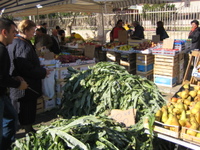 From the fish warehouse I stepped out of a narrow doorway right into a raucous open produce market. This time of year there were huge bulbs of fresh fennel, artichokes, still attached to their long stems. Fava beans, and oranges from nearby provinces were also on display.
From the fish warehouse I stepped out of a narrow doorway right into a raucous open produce market. This time of year there were huge bulbs of fresh fennel, artichokes, still attached to their long stems. Fava beans, and oranges from nearby provinces were also on display.
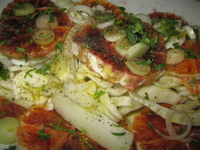 The fennel and oranges are thinly sliced, and with a little bit of chopped celery, olive oil, and salt, make an excellent salad.
The fennel and oranges are thinly sliced, and with a little bit of chopped celery, olive oil, and salt, make an excellent salad.
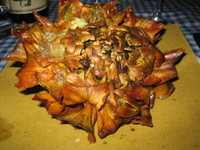 The artichokes are put in any imaginable dish. My favorite is Jewish-style, where the artichoke is flattened, then deep fried until crisp, then laced with a liberal dose of salt. The leaves get so crunchy they can be eaten like potato chips.
The artichokes are put in any imaginable dish. My favorite is Jewish-style, where the artichoke is flattened, then deep fried until crisp, then laced with a liberal dose of salt. The leaves get so crunchy they can be eaten like potato chips.
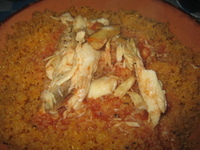 Later that night at dinner I tried a Trapanese specialty, fish cus cus. This is a dish brought to the region by the Arabs when THEY ruled Sicily in the 9th century. Delicately scented tomato broth containing poached fish and/or shellfish is ladled over couscous, small grains of durham semolina pasta. The broth is scented with cinnamon and nutmeg, which is very Arabic in nature.
Later that night at dinner I tried a Trapanese specialty, fish cus cus. This is a dish brought to the region by the Arabs when THEY ruled Sicily in the 9th century. Delicately scented tomato broth containing poached fish and/or shellfish is ladled over couscous, small grains of durham semolina pasta. The broth is scented with cinnamon and nutmeg, which is very Arabic in nature.
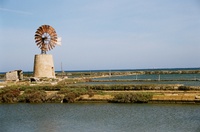 Just to the south of Trapani are vast expanses of land just barely covered by the sea. They are salt flats….where hot sun and backbreaking labour slowly produced sea salt. Salt used to be a much more valuable commodity. Wars were fought over it, taxes levied on it; Roman soldiers were even paid in salt. Looking across the abandoned flats, you can still see windmills dotting the landscape, which were used to pump sea water into the flats, and also to grind the salt into finer crystals once it had dried.
Just to the south of Trapani are vast expanses of land just barely covered by the sea. They are salt flats….where hot sun and backbreaking labour slowly produced sea salt. Salt used to be a much more valuable commodity. Wars were fought over it, taxes levied on it; Roman soldiers were even paid in salt. Looking across the abandoned flats, you can still see windmills dotting the landscape, which were used to pump sea water into the flats, and also to grind the salt into finer crystals once it had dried.
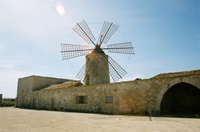 One of the windmills is part of a salt museum that documents the history of the industry in Trapani. Water is still pumped into some of the flats to be evaporated, leaving the salt crystals behind. I was able to buy a kilo of Trapani salt for about 75 cents at a local grocery store.
One of the windmills is part of a salt museum that documents the history of the industry in Trapani. Water is still pumped into some of the flats to be evaporated, leaving the salt crystals behind. I was able to buy a kilo of Trapani salt for about 75 cents at a local grocery store.
There is much more to Sicilian food than I can tell you here now. The special pecorino cheeses made with sheep’s milk, the smooth and fresh ricotta cheese that goes in everything from pastries to pasta, the almonds that are turned into Marzipan and sculpted into incredibly detailed portrayals of fruits and vegetables. And my most lasting impression from this trip…driving through fields and fields of orange trees, and drinking in the sweet aroma of the blossoms. I felt like I belonged there, and now have a better understanding of the lives my grandparents led so many years ago. To try the recipes I mentioned today, visit this Pacific Palate posting from today.
To listen to today’s program in streaming Real Audio, click here.

